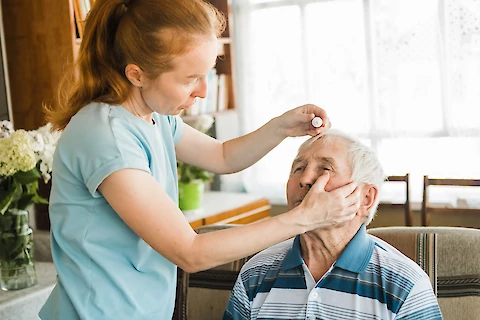
As we age, certain health conditions may require extra care and attention. Glaucoma is one such condition that can significantly affect seniors' lives. If you are a caregiver for a senior living with glaucoma, your role is integral in supporting them and managing the condition. From ensuring their medication routine to scheduling regular eye check-ups, we'll guide you through the ins and outs of glaucoma management.
Understanding Glaucoma
Glaucoma is a group of eye diseases that can cause damage to the optic nerve, which is responsible for transmitting visual information from the eye to the brain. It is characterized by increased pressure within the eye (intraocular pressure). However, glaucoma can also occur with normal or even low intraocular pressure. If left untreated, it can lead to gradual vision loss and blindness. Seniors are particularly at risk.
Signs and Symptoms
Glaucoma is also called the "silent thief of sight" because it typically has no early symptoms. Peripheral vision loss is usually gradual and painless. Many people may not notice it until significant damage has occurred. In angle-closure glaucoma, symptoms may include severe eye pain, headache, blurred vision, and nausea.
Early Detection and Diagnosis
Regular eye exams are essential for early detection and diagnosis. Eye doctors measure intraocular pressure, examine the optic nerve, and assess visual fields to determine if glaucoma is present.
Treatment Options
While glaucoma has no cure, early detection and appropriate treatment can slow or halt its progression. Your eye doctor will discuss different treatment options based on your unique circumstances. Eye drops are a common option as they help lower intraocular pressure. Some doctors may find oral medications or laser therapy more appropriate for your condition. In some cases, your eye doctor may recommend surgery.
Role of Caregivers in Glaucoma Management
As a caregiver, you play a vital role in managing your loved one's glaucoma. This is especially true with medication compliance. Regular medication is crucial in controlling glaucoma and preventing vision loss. You can help by providing medication reminders to ensure adherence. Checking supplies and refilling prescriptions on time can go a long way.
One of the cornerstones of glaucoma management is regular visits to the ophthalmologist. By facilitating these visits, you ensure your senior's condition is regularly monitored. If there are changes in their vision or discomfort, these timely visits can catch them early on. This helps ensure early intervention.
Sometimes, vision loss can occur. Adjustments might be necessary should this happen. Be there for your senior loved one, practically and emotionally. This might include ensuring their living space is safe to navigate, reading for them, or offering reassurance if they feel frustrated.
Senior Helpers Can Help
Caregivers play an essential role in glaucoma management for seniors. However, remember that you're not alone. In-home care services in Chattanooga, Hixson, or Ooltewah like Senior Helpers Chattanooga are here to support you. Contact us to learn more about our services and how we can assist you.